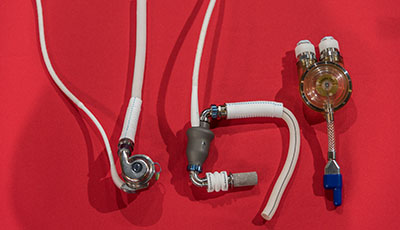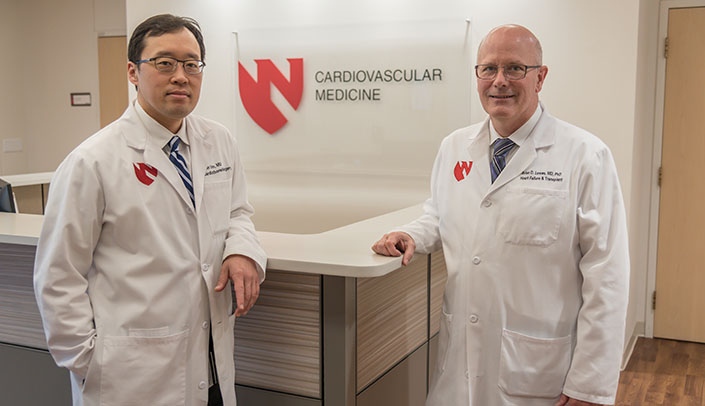UNMC and Nebraska Medicine were part of a major study that determined a new heart pump is an improvement over previous models, and perhaps as good as a heart transplant itself. These pumps are now available at the med center.
 |
The latest magnetically levitated centrifugal-flow device, left, is smaller than the previous two models. |
The new magnetically levitated centrifugal-flow device is smaller than previous models, “about half the size of an average person’s fist,” Dr. Um said.
“Historically, these pumps have not been perfect,” said Dr. Lowes. “Limitations existed, such as clotting off, stroke, or bleeding complications, because of anti-coagulation.”
So the search was on to build a better heart pump — and the study results suggest clinician-scientists may have found it.
The study lasted for several years and included more than 1,000 patients nationwide. With more than 60 enrollees, UNMC/Nebraska Medicine was one of the study’s top sites.
“We help pioneer these therapies,” Dr. Lowes said. “We’re one of the leading centers in the country, which means the world.”
These new pumps not only performed better, but also lasted longer — which in itself is another huge improvement.
“It’s a really big deal,” Dr. Um said. “When I first started, these pumps would last maybe 18 months.” Then, they would have to be replaced, and, “each time, it gets harder not only for the surgeon but for the patient.”
The fewer procedures, the better.
A left ventricular assist device (LVAD) can be just what the doctor ordered for a patient who can’t get a transplant, for whatever reason. And the results of this study, “are approaching what we see with a transplant,” Dr. Lowes said.
“We’ll probably see more and more patients choosing this as an option.”
Dr. Um is grateful to those who chose it as part of a clinical trial.
“A lot of these patients, they’re pretty scared,” he said. “They’re looking at their own mortality. We’re throwing a lot of terms at them. When we’re talking about a new device, a lot of people get overwhelmed.
“But people want to be part of medical research, and it’s a wonderful thing.”
In this case, it resulted in an advance.
“Many of these patients will probably be able to live out their lives with a mechanical heart,” Dr. Lowes said.

The UNMC Heart team saved my sisters life. We are all grateful for these live saving techniques and continued advances in medicine. Thank you!
Thanks to Dr. Um and all the others at NebraskaMed, I'm still here 8 years later. Over 4years with an LVAD and now 3+ with my new heart. Forever grateful tp the team there.
I would like to thank the UNMC heart team for saving my son's life. They do amazing things. After 3 years with a LVAD and a year into his heart transplant, he's doing great. Thank you to all of the staff at UNMC for all they did for our family.
This is Great News. LVAD 19 Months Transplant over 5 Yrs and going Strong. Dr Lowes., Dr Um are AMAZING!
Wonderful news! The heart team at UNMC saved my life! 4 months with an LVAD (had some major bleeding issues) and 5 years now with my heart transplant. Forever grateful to this wonderful team and my donor❣️